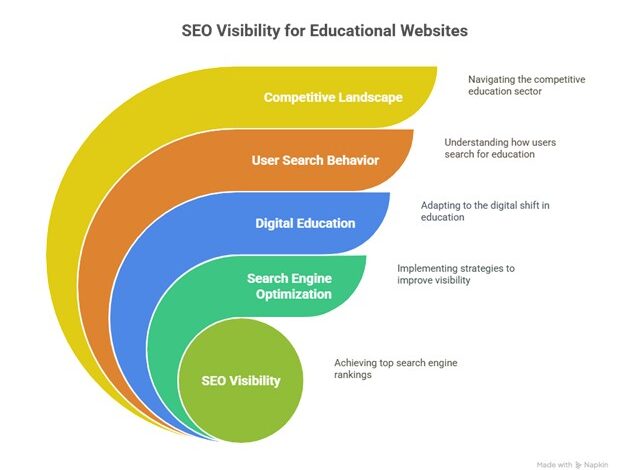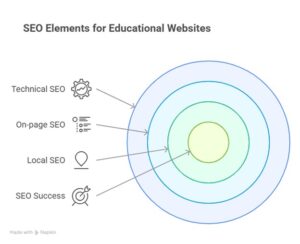The Importance of SEO for Educational Websites: Why Visibility Matters More Than Ever

Have you ever Googled a course and ended up on page 10? Neither has your student.
Let’s face it when was the last time you looked beyond the first page of Google when searching for anything? Now imagine a high school student researching “top MBA programs in India” or a parent looking up “best international schools near me.” If your educational website is not among the first few results then you are invisible.
And that is the problem.
Today over 93% of online experiences begin with a search engine, the battle for visibility has never been competitive especially in the education sector.
According to Google Trends, searches related to “online courses,” “diploma certifications,” and “e-learning platforms” have increased by more than 200% post-pandemic. The shift is undeniable, education has gone digital. And so must your SEO strategy.
The Role of Trust and Authority in Education SEO
Unlike paid ads, which disappear when the budget runs out, SEO for education websites compounds over time. When your site consistently ranks on top for high-value queries, it signals authority and reliability to both Google and your audience.
Moreover, Google’s ranking algorithm prioritizes websites that demonstrate E-E-A-T: Experience, Expertise, Authoritativeness and Trustworthiness.
Educational institutions are uniquely positioned to use this but they must actively showcase it through credible content expert authorship and transparent site structures.
Key SEO Elements for Educational Websites
Educational websites must implement key SEO elements that ensure discoverability, fast performance and relevance to their target audience’s needs. Here iswhat makes the biggest difference.

-
Technical SEO
Your website may look stunning but if it loads slowly or does not render well on mobile, Google wont be impressed. Speed, mobile responsiveness and crawlability are now basic expectations.
A few non-negotiables in 2025:
- Core Web Vitals: Metrics like Largest Contentful Paint (LCP), First Input Delay (FID), and Cumulative Layout Shift (CLS) directly impact rankings.
- Mobile Optimization: Over 65% of students use mobile devices for search. Google indexes mobile-first, so a desktop-only design is outdated.
- Structured Data: Implementing schema.org for courses, events, FAQs, and reviews helps search engines better understand and display your content.
-
On-page SEO
It is not just about having content but about having the right content. On-page SEO ensures that your web pages are optimized for both users and search engines.
Rather than flooding your homepage with institutional jargon, use language that your audience uses.
For instance, instead of “Postgraduate Business Administration Curriculum,” a better phrase would be “Best MBA Programs for Working Professionals in India.”
The best strategy? Create content around long-tail keywords is key. These are highly specific phrases such as:
- “Top animation design courses in Bangalore”
- “How to apply for scholarships in Canadian universities”
- “Affordable coding bootcamps for beginners”
These phrases may have lower search volume individually but they convert better because they match user intent more closely.
-
Local SEO
You will not trust, but Local SEO for educational institutions is important and especially for schools, colleges and training centers targeting students from specific cities or regions.
Claim your Google Business Profile, optimize your NAP (Name, Address, Phone number) and encourage Google Reviews. Also, ensure your site includes content that targets local queries.
Common SEO Mistakes Made by Educational Websites
Despite the awareness around SEO, many institutions still struggle due to these common errors:
Mistake 1: Ignoring Keyword Research
Many institutions focus on branding but forget to address what students are actually searching for.
Mistake 2: Using Too Much Academic Jargon
Overly technical content alienates searchers. Your blog shouldn’t read like a research paper but it should solve problems.
Mistake 3: Infrequent Updates
A blog last updated in 2019? Well that’s a big red flag. Google prefers fresh, regularly updated content.
Mistake 4: Not Having a Blog at All
Blogs are where keywords meet content. They also help build trust and show thought leadership.
SEO Success Stories in the Education Sector
Here are some noteworthy success stories that showcase the impact of strategic SEO done right. Partnering with the right education SEO agency can make all the difference in driving visibility and enrollment.
Simplilearn
This edtech company improved its organic traffic by over 400% in 18 months by investing in keyword-specific landing pages, a well-maintained blog strategy and technical SEO upgrades.
Today, they rank for competitive terms like “data science certification” and “AWS training online.”
University of Southern California (USC)
USC optimized their admission pages with FAQ schema and mobile responsiveness, resulting in a huge improvement in application clicks within a semester.
Local Indian Coaching Center
By optimizing their Google Business Profile, publishing weekly blogs targeting “IELTS coaching near me,” and collecting reviews, this small center saw a 3x rise in footfall within six months without spending a rupee on ads.
Want results like these? Avoid costly mistakes and partner with experts who understand the education space. Stan Ventures, a leading White Label SEO agency, delivers proven results and success in SEO for educational websites.
Actionable Tips for Education Website Owners
Well, you don’t need an enterprise budget to implement effective SEO. Here is a simple starter strategy:
- Create a blog and update it weekly with student-centric content. Think: “Top Career Paths After BBA” or “How to Choose the Right Engineering Stream.”
- Use free tools like Google Search Console to monitor keyword performance and fix technical issues.
- Install SEO plugins like Yoast (WordPress) to guide on-page optimization.
- Optimize image alt tags, headers and meta descriptions for every page with the help of education SEO company.
- Engage faculty to contribute articles. Their expertise adds credibility (and signals E-E-A-T to Google).
If you are an agency or consultant looking to scale SEO for multiple educational clients, consider contacting a reliable SEO reseller service to deliver expert-driven results.
SEO Is the New Admissions Strategy
In 2025, students and parents begin their educational journey with a Google search. If your institution is not showing up on Google you are missing out and not just on traffic but on trust, leads and long-term growth.



